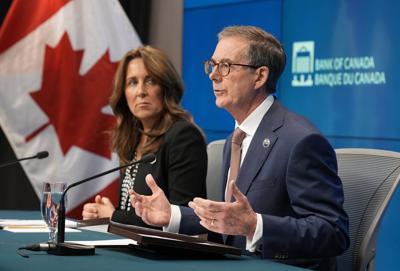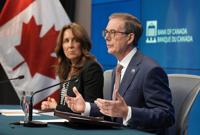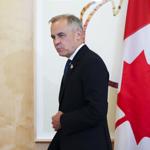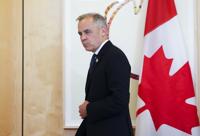A pair of reports from the Bank of Canada say tariff-related uncertainty continued to put a damper on business and consumer sentiment in the second quarter, but the worst-case trade scenarios previously anticipated seem less likely.
The central bank’s business outlook survey said business sentiment is "still subdued," but has improved from the sharp declines recorded in March and April 2025.
It said 28 per cent of firms are now planning for a recession in Canada, down from 32 per cent last quarter but still up from 15 per cent over the previous two quarters.
"Tariffs and trade tensions continue to weigh on the outlooks of many firms. In some cases, the negative effects on costs and sales that most businesses predicted last quarter have materialized, and firms expect them to persist," the report said.
"At the same time, firms have moderated their expectations for negative impacts."
It said one-third of firms expected higher tariff-related costs this quarter, compared with around two-thirds last quarter.
"Nevertheless, uncertainty around financial, economic and political conditions remains the top concern for firms," the report said.
"While worries about tariffs directly affecting Canadian businesses have eased slightly, new concerns have emerged about the broader impacts of tariffs on the global economy and on demand in Canada."
It added that uncertainty is still holding back firms on new investment plans, as they continue to conservatively manage their finances.
Sales outlooks remain pessimistic overall due to widespread concerns about the effects of a slowing economy, but the report said recent monthly surveys suggest some improvement in firms’ outlooks.
That's especially the case among exporters because few have been directly affected by current tariffs, it said. However, exporters currently facing sectoral U.S. tariffs, such as steel and aluminum manufacturers and firms in the auto sector, continued to report weak outlooks.
Weakness in near-term sales expectations has largely been driven by "broad spillover effects from the trade conflict," the report said.
That includes weak spending on services and capital goods by business customers, low consumer spending or concerns that consumers could start to spend less, weak outlooks in the housing sector, and soft sales outlooks among oil and gas firms.
Meanwhile, the Canadian survey of consumer expectations said spending intentions have weakened further because of persistent tariff threats.
Consumers also continued to see the labour market as soft amid "elevated" fears of job loss.
"The trade conflict is leading consumers to become increasingly cautious about their spending plans and to change their spending behaviour," the consumer survey said, adding many respondents expressed a desire to prioritize spending on Canadian goods and domestic vacations.
It noted consumers’ short-term inflation expectations have seen little change since increasing markedly in the first quarter of the year.
"While consumers expect large increases in motor vehicle prices over the next 12 months, their inflation expectations for essential goods and services declined this quarter," it said.
"More consumers cited tariffs as the most important factor affecting the Bank of Canada’s ability to control inflation."
The business outlook survey was done between May 8 and 28, while the Canadian survey of consumer expectations was conducted between April 24 and May 15, with follow-up phone interviews between May 20 and 26.
CIBC senior economist Katherine Judge pointed out that timing means the central bank wouldn't have captured the more recent threat by U.S. President Donald Trump of a 35 per cent blanket tariff on Canadian goods.
The survey period also came before the U.S. doubled steel and aluminum tariffs to 50 per cent starting in June.
While uptake in CUSMA compliance would limit the effect of a 35 per cent blanket tariff on businesses, she said they are staying "cautious amidst heightened trade uncertainty."
"Businesses reported that their ability to pass on higher tariff-related costs to consumers was limited by weak demand, and many firms are absorbing the costs in their margins," Judge said in a note.
The reports come ahead of the Bank of Canada’s next interest rate decision and monetary policy report set for July 30.
Deputy governor Sharon Kozicki signalled in a speech last month that the Bank of Canada has been relying more on alternative data sources such as surveys to cut through some of the uncertainty in traditional economic data.
The central bank held its key interest rate steady at 2.75 per cent in April and June.
While these surveys are "unlikely to move the needle for next week’s rate decision," Desjardins managing director and head of macro strategy Royce Mendes said he expects the central bank "to take a dovish tone in its communications, which could see rate cut expectations rebuild."
"Worries about tariff passthrough and inflation expectations were the reasons that the Bank of Canada held rates back in June, but those look less concerning in these surveys," said Mendes in a note.
"While central bankers probably won’t ease monetary policy next week, there is ample scope for them to resume their cutting cycle later in the year should the economy continue to stagnate."
This report by °µÍø½ûÇø was first published July 21, 2025.








































